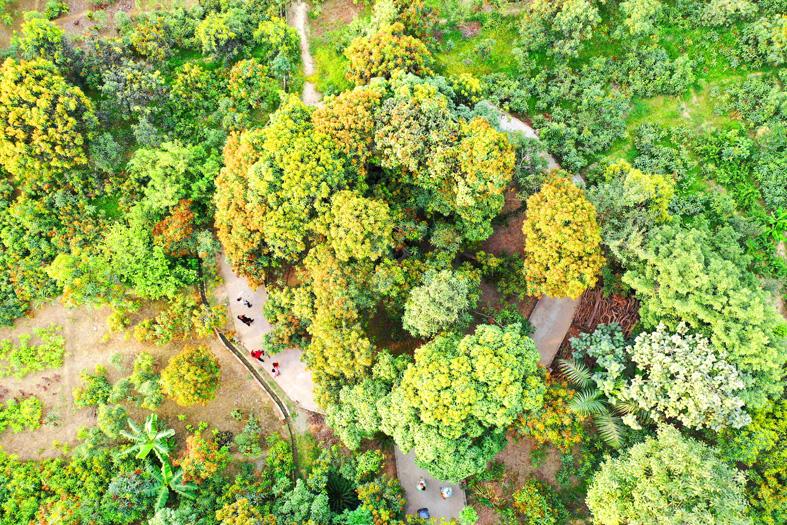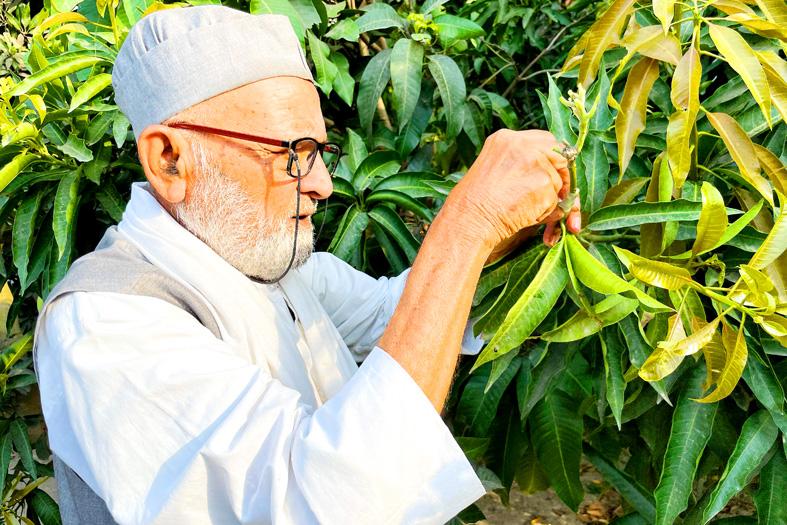Every day, Indian octogenarian Kaleem Ullah Khan wakes at dawn, prays, then ambles about 1.6km to his 120-year-old mango tree, which he has coaxed into producing more than 300 varieties of the beloved fruit over the years.
His footsteps quicken as he draws nearer and his eyes light up as he peers closely at the branches through his spectacles, caressing the leaves and sniffing the fruit to see if any are ripe.
“This is my prize of toiling hard in the scorching sun for decades,” the 82-year-old said in his orchard in the small town of Malihabad.

Photo: AFP
“For the naked eye, it’s just a tree, but if you see through your mind, it’s a tree, an orchard and the biggest mango college in the world,” he said.
The school dropout was just a teenager when he conducted his first experiment in grafting, or joining plant parts to create new mango varieties.
He nurtured a tree to produce seven new kinds of fruit, but it blew down in a storm.

Photo: AFP
However, since 1987, his pride and joy has been the 120-year-old specimen, a source of more than 300 different types of mangoes, each with their own taste, texture, color and size, he said.
One of the earliest varieties he named “Aishwarya” after Bollywood star and 1994 Miss World beauty pageant winner Aishwarya Rai Bachchan.
To this day, it remains one of his “best creations,” he said.
“The mango is as beautiful as the actress. One mango weighs more than 1kg, has a tinge of crimson to its outer skin and it tastes very sweet,” Khan said.
Others he named in honor of Indian Prime Minister Narendra Modi and cricket hero Sachin Tendulkar. Another is “Anarkali,” or pomegranate blossom, and has two layers of different skin and two different pulps, each with a distinctive aroma.
“People will come and go, but the mangoes will remain forever, and years after, whenever this Sachin mango will be eaten, people will remember the cricketing hero,” the father of eight said.
Standing 9m tall, his treasured tree has a stout trunk with wide-spreading, thick branches that yield a pleasant shade against the Indian summer sun. The leaves are a patchwork of different textures and smells. In some places, they are yellow and glossy, and in others, a dark, dull green.
“No two fingerprints are the same, and no two mango varieties are similar. Nature has gifted mangoes with traits like humans,” Khan said.
His method for grafting is intricate, and involves diligently slicing a branch from one variety, leaving an open wound into which a branch from another variety is spliced and sealed with tape.
“I will remove the tape once the joint becomes sturdy, and hopefully, this new branch will be ready by next season, and bear a new variety after two years,” he said.
Khan’s skills have won him numerous accolades, among them one of India’s highest civilian honors in 2008, as well as invitations to Iran and the United Arab Emirates.
“I can grow mangoes even in a desert,” he said.
India is the world’s largest producer of mangoes, accounting for half of global output. Malihabad, in the northern state of Uttar Pradesh, has more than 30,000 hectares of orchards and accounts for nearly 25 percent of the national crop.
Mostly owned by families for generations, the orchards are a mango lover’s paradise, with the best-known variety possibly the melt-in-the-mouth Dasheri, named for the nearby village where it originated in the 18th century.
However, farmers are worried about climate change, with a heat wave this year destroying 90 percent of the local crop, the All-India Mango Growers Association said. The number of varieties has also fallen, which Khan blames on intensive farming techniques and the widespread use of cheap fertilizers and insecticides.
Growers also plant too many trees packed too tightly together, leaving no space for moisture and dew to settle on the leaves, he said.
However, Khan said he still has a good life.
“I recently moved into a new house inside the farm to be closer to my beloved tree, which I’ll keep working on till my last breath,” he said.

Indonesia was to sign an agreement to repatriate two British nationals, including a grandmother languishing on death row for drug-related crimes, an Indonesian government source said yesterday. “The practical arrangement will be signed today. The transfer will be done immediately after the technical side of the transfer is agreed,” the source said, identifying Lindsay Sandiford and 35-year-old Shahab Shahabadi as the people being transferred. Sandiford, a grandmother, was sentenced to death on the island of Bali in 2013 after she was convicted of trafficking drugs. Customs officers found cocaine worth an estimated US$2.14 million hidden in a false bottom in Sandiford’s suitcase when

CAUSE UNKNOWN: Weather and runway conditions were suitable for flight operations at the time of the accident, and no distress signal was sent, authorities said A cargo aircraft skidded off the runway into the sea at Hong Kong International Airport early yesterday, killing two ground crew in a patrol car, in one of the worst accidents in the airport’s 27-year history. The incident occurred at about 3:50am, when the plane is suspected to have lost control upon landing, veering off the runway and crashing through a fence, the Airport Authority Hong Kong said. The jet hit a security patrol car on the perimeter road outside the runway zone, which then fell into the water, it said in a statement. The four crew members on the plane, which

Japan’s ruling Liberal Democratic Party (LDP) and its junior partner yesterday signed a coalition deal, paving the way for Sanae Takaichi to become the nation’s first female prime minister. The 11th-hour agreement with the Japan Innovation Party (JIP) came just a day before the lower house was due to vote on Takaichi’s appointment as the fifth prime minister in as many years. If she wins, she will take office the same day. “I’m very much looking forward to working with you on efforts to make Japan’s economy stronger, and to reshape Japan as a country that can be responsible for future generations,”

SEVEN-MINUTE HEIST: The masked thieves stole nine pieces of 19th-century jewelry, including a crown, which they dropped and damaged as they made their escape The hunt was on yesterday for the band of thieves who stole eight priceless royal pieces of jewelry from the Louvre Museum in the heart of Paris in broad daylight. Officials said a team of 60 investigators was working on the theory that the raid was planned and executed by an organized crime group. The heist reignited a row over a lack of security in France’s museums, with French Minister of Justice yesterday admitting to security flaws in protecting the Louvre. “What is certain is that we have failed, since people were able to park a furniture hoist in the middle of